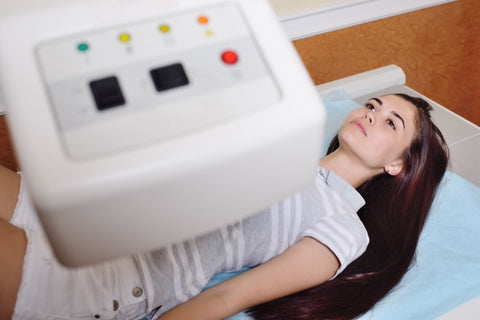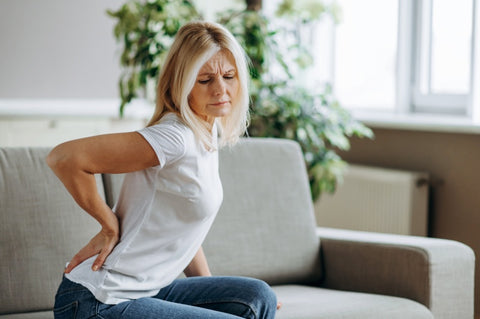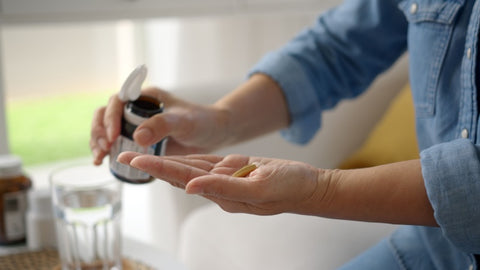
When You Feel Better, You Look Better
As women, we juggle countless responsibilities, from careers to families to personal pursuits. Amidst the hustle and bustle of life, it's easy to overlook the silent yet crucial aspect of our health: bone density. Often overshadowed by other health concerns, maintaining strong bones is essential for our overall well-being as we age.
Not only does it affect our physical appearance but also our mental health. It's not enough to focus on external beauty treatments alone, looking and feeling younger happens due to a combination of a healthy diet, regular exercise AND the use of amazing organic skincare products from Adonia Organics.

The Importance of Bone Density for Women
Bone density, often referred to as bone mass, is a critical indicator of bone health. It signifies the amount of mineral content in bones, particularly calcium and phosphorus, which contribute to their strength and resilience. For women, maintaining optimal bone density is of paramount importance, especially as we age and undergo hormonal changes, particularly during menopause.
Strong bones provide the structural framework for our bodies, supporting muscles and organs, and facilitating mobility. Beyond physical strength, adequate bone density is also linked to improved posture, reduced risk of fractures, and enhanced overall health and longevity.
Physical Appearance and Bone Density

While the connection between bone density and physical appearance may not be immediately apparent, it plays a significant role in shaping our silhouette and overall aesthetic. Strong bones provide the foundation for good posture, helping us stand tall and exude confidence. In contrast, decreased bone density can lead to a stooped posture, making us appear older and less vibrant.
Furthermore, bone density influences body composition, affecting how lean muscle mass is distributed. Higher bone density often correlates with greater muscle tone and definition, contributing to a more sculpted and youthful appearance. Conversely, low bone density may result in decreased muscle support, leading to a softer, less defined physique.
Mental Health and Bone Density
The relationship between bone density and mental health is a nuanced yet crucial aspect of overall well-being. Studies have shown that women with lower bone density are more susceptible to mood disorders such as depression and anxiety. This correlation can be attributed to various factors, including decreased mobility, chronic pain from fractures, and hormonal imbalances associated with bone loss.

Moreover, the fear of osteoporosis and fractures can induce anxiety and diminish quality of life, leading to social withdrawal and decreased self-esteem. By prioritizing bone health, women can mitigate these risks and maintain their mental resilience as they age.
Strategies for Maintaining Bone Density
Now that we understand the significance of bone density for women's health and well-being let's explore practical strategies to preserve and enhance it throughout life:

-
Balanced Diet:
- Incorporate calcium-rich foods such as dairy products, leafy greens, almonds, and fortified cereals into your diet.
- Ensure an adequate intake of vitamin D, which aids in calcium absorption. Sources include fatty fish, eggs, and fortified foods.
- Limit consumption of caffeine, alcohol, and sodium, as they can interfere with calcium absorption and contribute to bone loss.

-
Regular Exercise:
- Engage in weight-bearing exercises such as walking, jogging, dancing, and strength training to stimulate bone growth and maintenance.
- Include activities that improve balance and coordination, reducing the risk of falls and fractures.
- Aim for at least 30 minutes of moderate-intensity exercise most days of the week to reap the full benefits for bone health.
-
Lifestyle Modifications:

- Avoid smoking, as it accelerates bone loss and increases the risk of fractures.
- Limit excessive alcohol consumption, as it interferes with calcium absorption and can weaken bones over time.
- Maintain a healthy body weight, as being underweight or overweight can negatively impact bone density.
-
Regular Bone Density Testing:

- Schedule periodic bone density scans, especially post-menopause, to monitor changes in bone health and assess fracture risk.
- Discuss the results with your healthcare provider to determine appropriate interventions or treatments if needed.
-
Supplemental Support:

- Consider calcium and vitamin D supplements if dietary intake is inadequate or if recommended by your healthcare provider.
- Explore other supplements such as magnesium, vitamin K, and collagen, which play supporting roles in bone health.
As women, prioritizing bone health is essential for maintaining our vitality and well-being as we age. Strong bones not only support our physical appearance but also contribute to mental resilience and overall quality of life. By adopting a proactive approach to bone density maintenance through balanced nutrition, regular exercise, and lifestyle modifications, we can empower ourselves to lead active, fulfilling lives well into our golden years. Remember, investing in bone health today paves the way for a stronger, more vibrant tomorrow.
